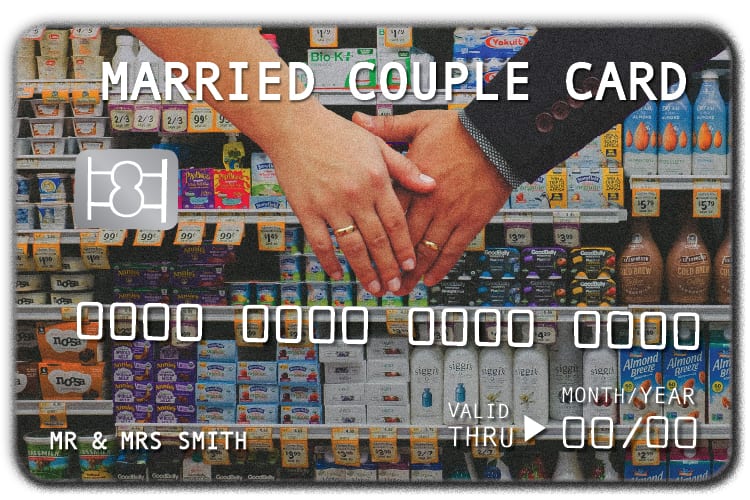
Remember those credit cards you got to pay for the dress and rings and tux and catering and honeymoon? Well, some of those will become your best friends as you ease from nervous newlyweds into normal old married folks. Others will fade into oblivion as you no longer need their targeted perks—but don’t cancel them; just stop using them or downgrade to a card with no annual fee (it’s a credit score thing).
This is where planning for the long haul comes into play. Do you have a long-term strategy? It should address these topics:
- Will you have a joint bank account?
- Who pays the bills?
- What’s your monthly budget?
- Which credit cards should you get/keep?
Your answers to the first three questions can help you with the last one, as your spending habits dictate which cards make the most sense. The couples credit-card categories in this article are:
- Best Credit Cards for Saving
- Best Credit Cards for One-Time Big Spenders
- Best Credit Cards for Consistently Moderate Spenders
- Best Credit Cards for Traveling
- What to Know About Co-Branded Airline/Hotel Cards
- Best Credit Cards for Wining & Dining (Restaurants and Bars)
- Best Credit Cards for Shopping/Groceries
- Best Credit Cards for All of the Above
Important note: Credit card rates and perks are accurate as of publish date, but we suggest you confirm the policies on each card’s website before you make any purchases as details can change. Using credit cards for big purchases reaps huge rewards but only if you plan to auto-pay immediately or pay off the bill quickly. Some cards have annual fees.
*Additional Note: Due to Covid-19, many credit card companies have extended the time period in which consumers have to meet the spend bonus. Consult the terms and conditions for each card for more information.
Best Credit Cards for Saving
If your goal is to save — and not turn your spending into fabulous travel — then a cash back card is for you. This way, you’ll be getting money back every time you make a purchase, which you could transfer to a savings account or use for online shopping. You’ll find a few of these cash back cards detailed out below, and what you spend on should help you you to determine which one to get.
Best Credit Cards For One-Time Big Spenders
If you have a lot of one-time expenditures in the near future (i.e. you’re buying new furniture or a car), consider the Discover It Cashback card.
Discover It Cashback
This card has no annual fee and 0% APR for 14 months.
You’ll get 1% back on most purchases, but 5% cash back from a different category of business each quarter (the “deal” rotation changes seasonally) such as gas stations, grocery stores, restaurants, and Amazon.com (you’ll need to activate this extra credit by visiting the card’s website and opting in).
What will really get you some cash on those big purchases, though, is that Discover will also match all of the cash back you’ve earned at the end of your first year (no limit!). The key to using this card is staying on top of those different quarterly bonus categories and making sure all your splurge purchases happen in the first year, so you get as much cash return as possible.
Best Credit Cards For Consistently Moderate Spenders
For a couple planning a more moderate level of spending (i.e., few big purchases, just the normal expenses, such as groceries, gas, and clothes), a more sophisticated-but-complicated approach would be to get two cards, which together earn more points for all imaginable spend categories than just one card can do. The dynamic duo often invoked includes the Chase Freedom Unlimited (which gives 1.5x cash-back on all purchases) and Chase Freedom (5x cash back on rotating categories), both of which earn valuable Ultimate Rewards points.
Chase Freedom Unlimited
This card offers 1.5% percent cash back on all purchases, plus an extra $200 if you spend $500 within the first three months of opening the card. The no-annual fee card has 0% APR for 15 months from account opening; just don’t plan to use it abroad or you’ll get hit with a 3% foreign transaction fee.
Chase Freedom
You get 5% cash back on up to $1,500 in combined purchases in so-called bonus categories each quarter with this no-fee card. But you need to “activate” those categories every quarter by opting in online. These bonus categories include things like grocery stores, gas stations, fitness memberships, streaming services, Internet/phone bills and more. For all other purchases, you’ll earn an unlimited 1% cash back. And yes, this Chase card also offers an extra $200 if you spend $500 within the first three months of opening the card with 0% APR for 15 months from account opening.
Best Credit Cards for Traveling
Couples who plan to fly into the sunset should get a “luxury travel” credit card with flexible rewards. Despite having hefty annual fees, these types of cards will essentially take you farther, open up the possibility of flying first class, and offer things like lounge access, hotel elite status, travel credits and more. With these cards, you’ll be able to transfer your hard-earned reward points to a number of airline and hotel partners—which is not something that all credit cards do.
Amex Platinum
The Amex Platinum card has the highest annual fee at $550, but comes with perks like Centurion lounge access, a $200 airline fee credit (making the annual fee effectively more like $350), and a credit for Global Entry or TSA Pre✓ (say adios to long customs and security lines, and you can use this $100 credit for family members if you already have these services). There’s more too: You can earn 60,000 bonus points after spending $5,000 in the first three months, and receive 5X points per dollar spent on flights booked through Amex Travel (an easy phone call) or directly on the airline’s website, among other perks like Marriott and Hilton hotel elite status, elite car rental company status, a $100 Saks Fifth Avenue credit per year and more (I say “more” a lot because the term sheets are long and complicated and the terms themselves change from time to time).
Chase Sapphire Reserve
The Chase Sapphire Reserve’s $550 annual fee may sound like a lot too, but when you realize you get a $300 statement credit back on any combination of travel purchases, that takes it down to a more reasonable $250. It’s another way to amass points quickly thanks to the current bonus of 50,000 Ultimate Rewards points after you spend $4,000 on purchases in the first 3 months from account opening, plus 3X points per dollar spent on travel (and dining), which includes flights, taxis, Ubers and other modes of transportation. And, the card offers Priority Pass airport lounge access, Lyft and Door Dash perks and a credit for Global Entry or TSA Pre✓.
Co-branded Cards
If you or your partner is loyal to a particular hotel or airline brand, or travels on a specific airline for work, then a co-branded hotel or airline card is another smart option (and this is not an either-or proposition… you can get any combination of cards as long as you have good enough credit and can pay off the various minimum spends required to get the bonus points from each program). Co-branded cards — joint ventures between Amex, Visa or Mastercard and a hotel or airline — can be lucrative, but keep in mind you won’t have as much flexibility with travel and rewards (you have to fly Delta if you get a Delta card and stay at a Hyatt if you get a Hyatt card). Large hotel chains such as Hilton, Hyatt, Marriott, and IHG all have their own co-branded cards, as do airlines like Delta, American, Southwest and United.
Best Credit Cards for Eating/Drinking/Dining (Restaurants and Bars)
Foodies, wine snobs, hop heads, cocktail connoisseurs and couples that count on partying at bars and clubs regularly should get a card that offers bonus points on dining and entertainment.
Amex Gold
One of the best dining cards around, the American Express Gold Card gives you 4X points per dollar spent on dining (and at grocery stores), as well as some other perks like a $100 airline fee credit and a 35,000 Amex Membership Rewards, point bonus if you spend $4,000 in the three months of card membership. The card has a $250 annual fee.
Capital One Savor Rewards
For couples that eat out and enjoy going out — to movies, musicals, concerts, plays, tourist attractions, zoos or theme parks — the Capital One Savor Cash Rewards is ideal since you get 4% cash back on both dining and entertainment expenses, 2% at grocery stores and 1% on everything else. If you spend a minimum of $3,000 in the first three months of card membership, you get an additional $300 cash back, and the annual fee is $95. Easy to understand, no giant fees.
Best Credit Cards for Shopping/Groceries
Maybe you’re laying low after a whirlwind wedding or are you’re the type who likes to relax at home. Or, perhaps you’re considering having a family and focusing on building a household. Or you already have kids, which means you’re spending even more on everyday purchases like groceries.
Amex Blue Cash Everyday
Savers should look at the Amex Blue Cash Everyday, where you get 3% cash back at U.S. supermarkets (up to $6,000 per year), 2% cash back on US gas purchases (and some US department stores) and 1% on everything else. The no-annual-fee card gives its cash back in the form of rewards points, but you can redeem those points for statement credit. You also get $150 back after spending $1,000 in the first three months.
Amex Everyday
The Amex Everyday card is another contender for homebodies. The hot perk with this one is that it offers 20% extra points bonus if you make 20 purchases or more in one billing cycle. So if you’re hopping around to the dry cleaners, the drugstore, the hardware store, the supermarket and more, you are rewarded handsomely. The rest of the package is so-so: The card has no annual fee and works with Amex Membership Rewards points, which can be redeemed or transferred for flights, hotels and more.While you only earn 1X point per dollar on most purchases, you get 2X points on supermarkets (up to $6,000 per year) and on Amex Travel. And the card offers a 10,000-point bonus after spending $1,000 in the first three months of card membership and has 0% APR for the first 15 months.
Amex Everyday Preferred
A step up is the Amex Everyday Preferred. Although it has a $95 annual fee, you get a 15,000-point bonus after spending $1,000 in the first three months of card membership and the card has 0% APR for the first 12 months. The card offers 3X at supermarkets (up to $6,000 per year), 2X at gas stations and gives you 30% extra points bonus if you make 30 purchases or more in one billing cycle. The key here is to decide if you can make 30 or more purchases and if you can handle the annual fee and shorter 0% APR.
Best Credit Cards for Couples Who Spend and Save (and Want Only One Card)
This is a tough call because it really depends on your spending habits. But generally, if you find yourself spending on a little bit of everything and you want cash back, the Discover It is a solid choice, at least for the first year.
If it’s rewards you’re after, the Amex Everyday Preferred is a dependable choice for those spending on groceries and gas, while the Chase Sapphire Reserve, or even the Chase Sapphire Preferred (if you need a lower annual fee) is ideal for those who spend on dining and travel.
Should You Add an Authorized User?
This is a big question for couples. Adding an authorized user to your credit card depends on a few things, outlined below:
- Your credit: If your partner has poor credit, they may not be able to get their own card right away. Adding them as an authorized user is an excellent way to start to build their credit. Just make sure to make your payments in a timely manner and avoid debt.
- Your spending habits: If you won’t likely spend as much as the card requires to earn the bonus points, it may make more sense to spend together on one card, ensuring you can hit that spend bonus. On the other hand, if your spend is high, that may justify you each getting a different card to diversify your options, or each getting the same card to maximize benefits in one program. For example, if you’re concerned you can’t hit the $5,000 in spend for the Amex Platinum, you can add your spouse as an authorized user to help. Or, you can both get your own versions of this card to double the bonus points, or each get a different Amex card to maximize Amex Rewards. Or, each of you could get a card with a different bank like Capital One and Chase, diversifying your earnings options and perks. The options are endless, but evaluating your spending habits is the best way to start thinking about which cards to get and when to add authorized users.
- Bonuses and Fees: Some cards offer point bonus for adding an authorized user, or give the added user lounge access or travel/purchase protection. But beware, as some of these cards will also charge you a fee for adding an authorized user. Read the fine print before adding your partner.
Biggest Mistakes People Make
- Don’t start your marriage off on the wrong foot by getting into debt. This will negate any rewards or cash back you’ll earn.
- Don’t avoid discussing your spending habits. Now is not the time to keep secrets.
- Don’t panic if your applications get rejected a lot. You and your partner should slowly build credit together, which will help you get more cards and higher spend limits as time goes on.























